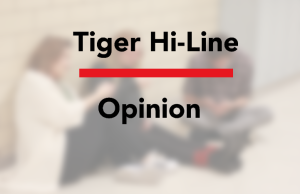Media painting sexed up picture of women
By: Olivia Martin
The world we live in today is overflowing with images of beautiful, sexy women. There is nothing wrong with beauty or sex appeal. However, the media often represents women in ways that are inappropriate, disrespectful and unnecessary.
Usually when we see images of women’s bodies, it is because they are being used to sell things. Oversexualized images can be found in all forms of media, but in advertisements especially. You’d be surprised, but the oversexualization of women can be viewed selling candy, burgers or even children’s toys. First and foremost, these depictions of women are offensive and demeaning, but they can also make absolutely no sense.
One time I saw an advertisement for M&Ms and I can remember clearly thinking, “What even is this?” The commercial personified the M&Ms, making it easy for viewers to distinguish which of the candies were designated males and females. Let’s just say this should be a rule: little chocolate candies should not have sexual attributes. But, this is how the commercial portrayed the green cartoon female M&M character. She wore white go-go boots, had prominent lips, perfectly manicured eyebrows, large eyelashes and a smoky, seductive voice. In short, the piece of candy had all of the assets that make the “perfect” woman. Meanwhile, the male M&Ms were “regular” guys. What I really want to know is why would anyone think little pieces of chocolate should be sold with stereotypical and cartoonish erotic appeal?
Another commercial that shocked me was for Hardee’s. In the commercial, model and Top Chef host Padma Lakshmi is shown eating a burger. Padma turns the usually unappealing act of eating a burger into a hyper-sexualized performance. Her only purpose in the commercial was to show off her long, oiled legs, her breasts and how to lick sauce off of her fingers in the most sexual way possible. Honesty, I am surprised that this commercial aired because it is quite risqué. What kind of standard does this set for women? I can guarantee that when I have eaten a burger, I have not worn a low-cut dress, had a face perfected by makeup or licked sauce off my fingers in a sexual way. In fact, me (or anyone) eating a burger would probably be the opposite of that.
Holding women to standards that demand us to be first sexual objects, and then people, is demeaning and unfair. And what about young women and girls? Toys geared to girls of younger ages like Barbie and Bratz are oversexualized and underrepresent most girls who do not have those body-types. As girls begin to grow up, they are bombarded with images of hyper-sexualized women on TV, in magazines and especially on social media. They are learning at a young age that to become valued, popular or liked, they have to be sexualized. Instagram definitely isn’t helping. And, do I even need to mention Toddlers and Tiaras?
However, some girls are realizing the unrealistic beauty standards that exist and how from a young age they feel social pressure to be sexy. Recently, Essena O’Neill, an Australian teenager who gained fame and praise on Instagram for her perfectly toned body, created waves. She decided to reject the “perfect” social media object that she had become, and re-edited all of her captions, describing the story behind her photos. She explained that all of her photos were taken to satisfy an oversexualized standard of beauty that gained her the praise she fed off of starting at age 12.
She writes, referencing a photo of herself wearing a dress, “Standing there and looking pretty is what I once aspired to do as a young girl. In our society if you’re pretty people will give you attention. So I made my appearance my worth. I’m writing these captions to show the reality of what I got consumed by. Human beings are SO MUCH MORE THAN OUR PHYSICAL FORMS.”
I think we all have things to learn from Essena. After dedicating her life to receiving praise by posting photos of her body on Instagram, she ultimately realized that it was an unfulfilling existence. Women and girls live in a world with constant pressure, from candy commercials commercials to Instagram stars, to be sexy and meet societal beauty standards. Part of that battle starts here, in schools: we need to not value girls and women for their beauty and sex appeal. Instead, we need to value them for what they can become as thinking, creative, productive, accomplished human beings. So, just eat your M&Ms plain, order a burger without the sexual condescension and like someone’s photo on Instagram because they are not objectifying themselves. And let’s get on with our real lives.







You must be logged in to post a comment Login